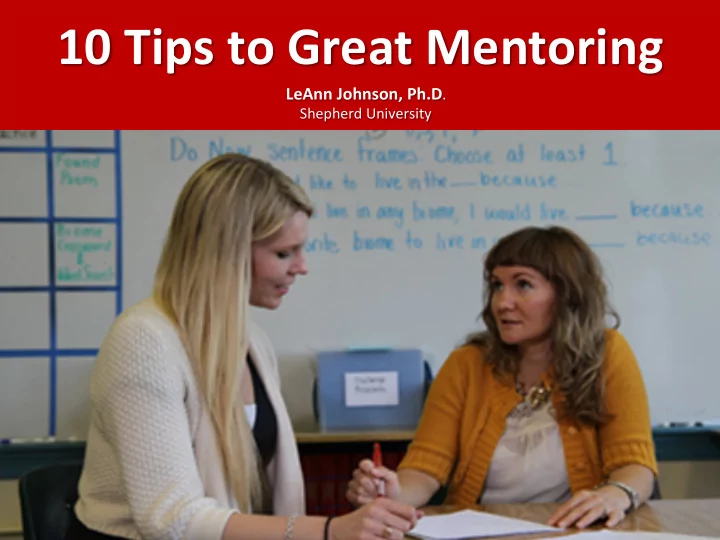

10 Tips to Great Mentoring LeAnn Johnson, Ph.D . Shepherd University
1. Make Time Ø Build a regular mee6ng 6me with your mentee into your schedule. Ø Don’t let other things bump it. Ø Stay focused.
2. Rapport Think back to your own experiences as a student or new teacher. Who was there for you? What characteris6cs/behaviors did they exhibit that made you feel supported? What if the mentee is just plain difficult?
3. InstrucAonal Support Ini6ate and maintain con6nual collegial dialogue based on shared experience Ø Begin at the mentee’s skill level – zone of proximal development Ø Create shared experiences o Team planning o Team teaching o Observing mentee o Being Observed (model) o Video Tape
4. Encourage ReflecAon It is not what you say. It is the ques6ons you ask that are important. Vikrant Parsai While holding a wri6ng conference, your mentee has difficulty maintaining awareness of the rest of the class. What ques*ons might you use to encourage reflec*on and problem solving in this area?
5. Feedback Ø Confirm appropriate outcomes of mentee reflec6on mirroring specific points for reinforcement. “I agree that xxxx.” Ø Extend mentee conclusions with specific ques6ons that push thinking to the next level. “Given what you think, what would happen if you xxx?” Ø Reserve ‘telling’ for those areas where the mentee does not have the knowledge needed to move to the next level. Ø Record main points in wri6ng.
6. Support Goal SeMng S pecific Ø Focus M easurable R ewarding Ø Priori6ze A Yainable Ø Make them SMART T imebound Remember, Rome wasn’t built in a day.
7. Model Personal Learning Be transparent about your own search for beYer answers and more effec6ve ways to meet student needs. No one appreciates a ‘know-it-all’ Anonymous
8. Be Flexible/Responsive Just as you adjust your ques6oning of students to meet their learning needs, adjust your communica6on and support according to mentees needs. Mentoring is an art form, not a recipe. There is no single approach to providing the best type of support
9. Face Hard ConversaAons Ø Don’t wait! Ø Plan the main points of the conversa6on Ø Leave unproduc6ve emo6ons at the door Ø Be objec6ve Ø End with a wriYen statement of the problem and what is required to fix it.
10. MoAvate Mentoring is a brain to pick, an ear to listen, and a push in the right direc6on. John C. Cosby
10 Tips to Great Mentoring LeAnn A. Johnson, Ph.D . Shepherd University 1. Make 6me 2. Develop Rapport 3. Give Instruc6onal Support 4. Encourage Reflec6on 5. Provide Feedback 6. Support Goal Seing 7. Model Personal Learning 8. Be Flexible/Responsive 9. Face Hard Conversa6ons 10. Mo6vate
Recommend
More recommend